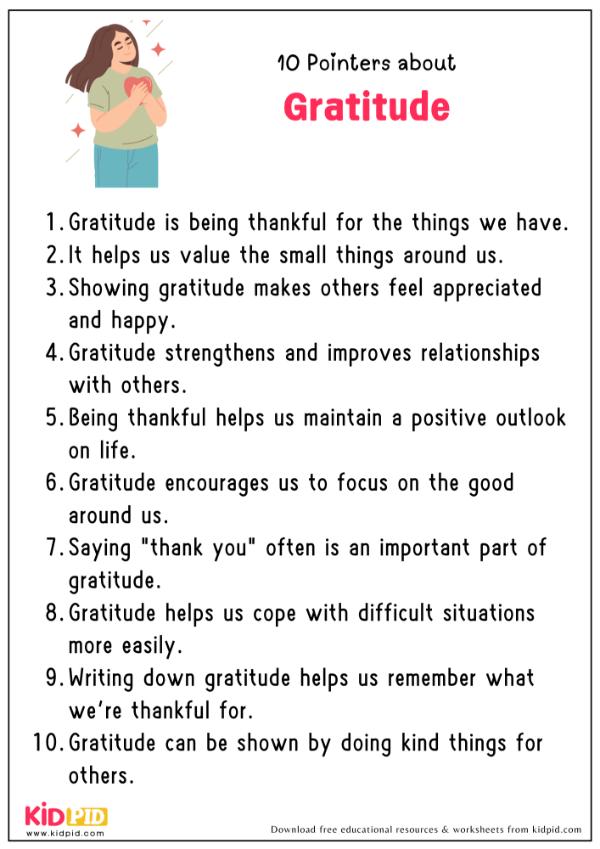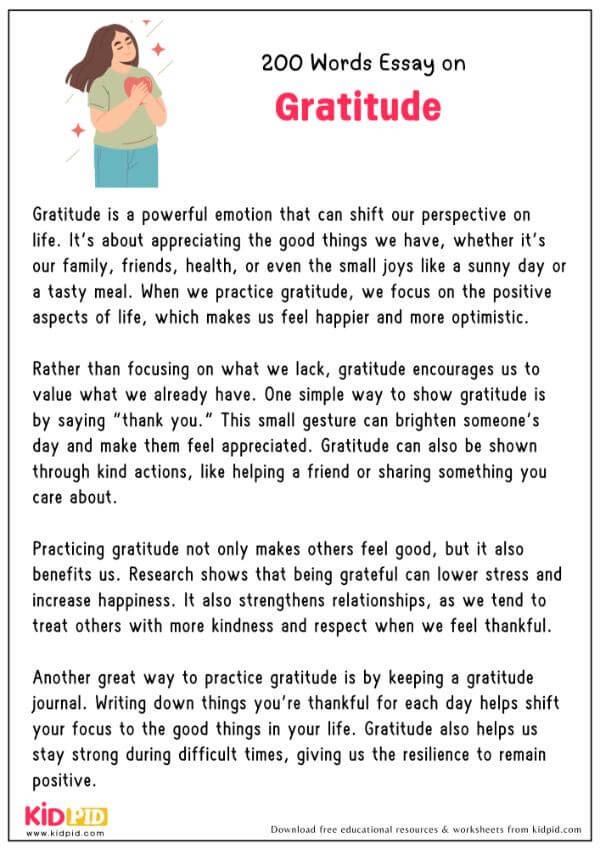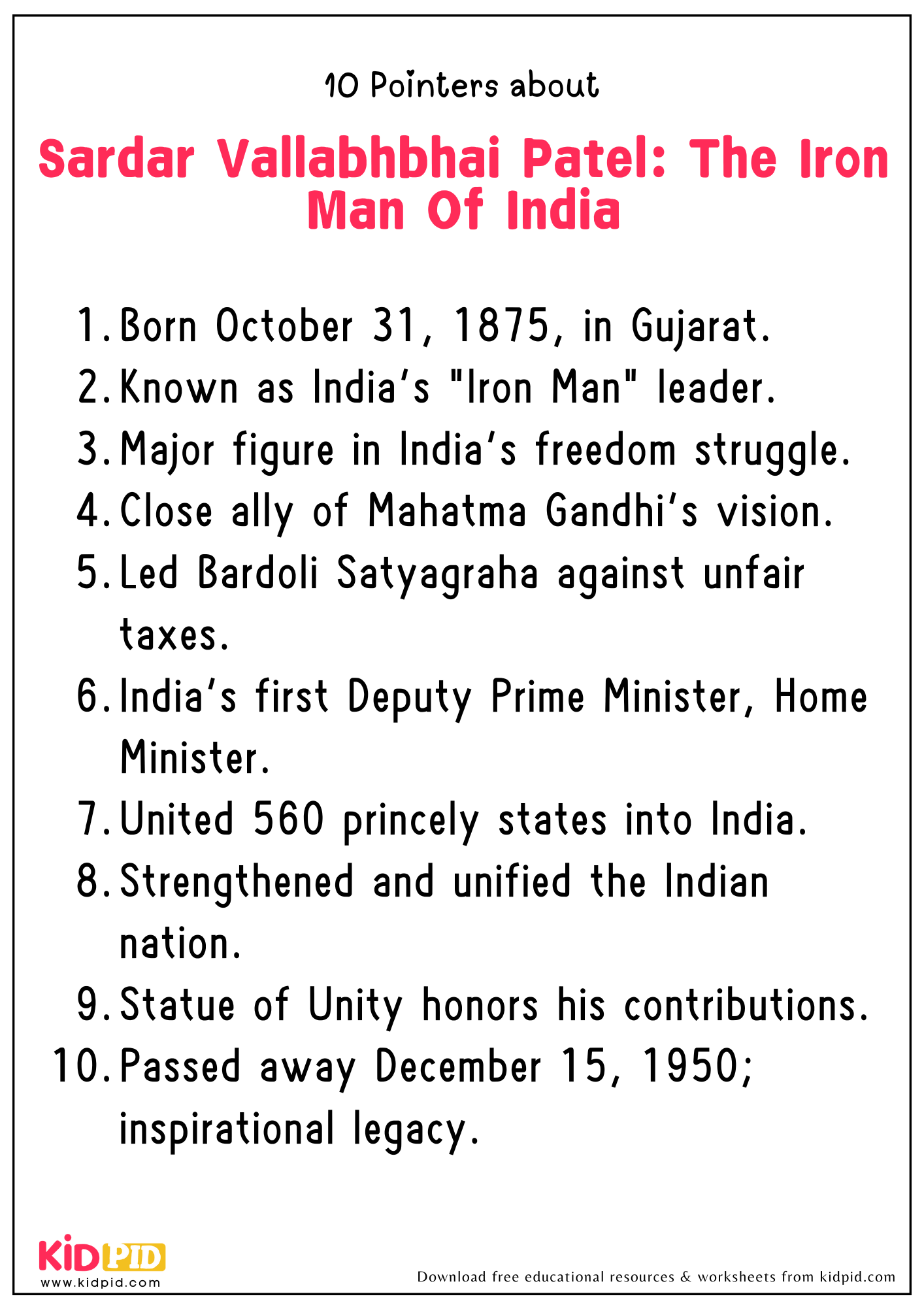An essay on Gratitude highlights the value of thankfulness in personal happiness.
Gratitude is the feeling of thankfulness and appreciation for the good things in life. It helps build positive relationships, improves mental health, and brings inner peace. Practicing gratitude daily can transform our mindset, making us more compassionate, humble, and optimistic in both personal and social aspects of life.
10 Pointers About Gratitude

- Gratitude is being thankful for the things we have.
- It helps us value the small things around us.
- Showing gratitude makes others feel appreciated and happy.
- Gratitude strengthens and improves relationships with others.
- Being thankful helps us maintain a positive outlook on life.
- Gratitude encourages us to focus on the good around us.
- Saying “thank you” often is an important part of gratitude.
- Gratitude helps us cope with difficult situations more easily.
- Writing down gratitude helps us remember what we’re thankful for.
- Gratitude can be shown by doing kind things for others.
Short Essay On Gratitude
Essay On Gratitude in 100 Words

Gratitude means feeling thankful for the good things in our lives. It’s about appreciating what we have, whether it’s family, friends, or simple joys like a sunny day. Showing gratitude can make us feel happier and more positive. When we say “thank you” or help others, we spread kindness and make people feel good. Gratitude also helps us focus on the good, even when things are tough. It’s a great way to improve our relationships and make our world a better place. Being grateful every day helps us see the beauty in life.
Essay On Gratitude in 200 Words

Gratitude is a powerful emotion that can shift our perspective on life. It’s about appreciating the good things we have, whether it’s our family, friends, health, or even the small joys like a sunny day or a tasty meal. When we practice gratitude, we focus on the positive aspects of life, which makes us feel happier and more optimistic.
Rather than focusing on what we lack, gratitude encourages us to value what we already have. One simple way to show gratitude is by saying “thank you.” This small gesture can brighten someone’s day and make them feel appreciated. Gratitude can also be shown through kind actions, like helping a friend or sharing something you care about.
Practicing gratitude not only makes others feel good, but it also benefits us. Research shows that being grateful can lower stress and increase happiness. It also strengthens relationships, as we tend to treat others with more kindness and respect when we feel thankful.
Another great way to practice gratitude is by keeping a gratitude journal. Writing down things you’re thankful for each day helps shift your focus to the good things in your life. Gratitude also helps us stay strong during difficult times, giving us the resilience to remain positive.
Essay On Gratitude in 300 Words
Gratitude is the feeling of thankfulness for the good things in life. It helps us stay happy and positive. When we appreciate our parents, teachers, and friends, we build stronger relationships. Simple acts like saying “thank you,” smiling, or writing a thank-you note show gratitude.
We should also be thankful for nature—trees, animals, and clean air. Keeping a gratitude journal helps us remember happy moments, like playing with friends or eating our favorite food. Helping others is another way to show gratitude. When we share or care for someone, we spread happiness.
Sometimes, we forget to be grateful and complain instead. But focusing on good things makes life better. Even on bad days, we can find something to appreciate, like a warm bed or a kind word.
Gratitude makes us kinder and more positive. It teaches us to value what we have instead of wanting more. When we practice gratitude every day, we become happier and make others happy too. Let’s start today by thanking someone who helped us! Gratitude is the feeling of being thankful for the good things in our lives. It can be as simple as appreciating our family, friends, or a beautiful day. When we feel grateful, we focus on the positives around us, which can make us happier. Showing gratitude is easy. We can say “thank you” to someone, or we can do something kind for others. By practicing gratitude, we make the people around us feel good and valued. It helps build stronger relationships and makes the world a friendlier place.
Being grateful also has many benefits for us. It helps us deal with difficult situations by encouraging us to look at the bright side. Writing down what we’re thankful for each day can help us remember the good things, even when things are tough. Gratitude also helps us feel more content and less focused on what we don’t have. In today’s fast-paced world, it’s easy to forget to be thankful, but taking a moment each day to reflect on what we are grateful for can make a big difference in how we feel.
Long Essay On Gratitude in 500 Words
Introduction
Gratitude is the practice of being thankful for the good things in life. It’s about recognizing the blessings we have, whether they are big or small. Practicing gratitude can have a powerful effect on our lives, helping us focus on the positive and improving our relationships. Gratitude is important because it helps us appreciate what we have and allows us to live a more fulfilled and happy life.
The Importance of Gratitude
Being grateful doesn’t mean that everything in life is perfect. It means that we choose to focus on what is going well, even when life is tough. Gratitude helps us shift our mindset. Instead of focusing on what we don’t have, we focus on the blessings we have, like our health, family, and friends. Practicing gratitude also helps us appreciate the small, everyday things, like the beauty of nature, a smile from a friend, or a warm meal.
Benefits of Gratitude
Practicing gratitude can make us feel happier. When we take time to be thankful for the good things in our lives, we feel more positive and less stressed. Studies show that people who practice gratitude are more likely to be happy, healthy, and successful. Gratitude also makes us more resilient, helping us cope with challenges and setbacks. It’s easier to stay calm and optimistic when we are grateful for the good things, even during difficult times.
Ways to Practice Gratitude
There are many ways to practice gratitude in our daily lives. One simple way is to say “thank you” to people who help us or show kindness. Acknowledging the efforts of others can make them feel appreciated and strengthen our relationships. Another way is to keep a gratitude journal. Each day, write down three things you are thankful for. This practice helps you focus on the positives and reminds you of the good things in your life.
You can also practice gratitude by showing kindness to others. Acts of kindness, like helping a friend or complimenting someone, not only show gratitude but also make others feel happy. Gratitude isn’t just about saying thank you—it’s about showing appreciation through our actions.
Gratitude and Mental Health
Gratitude has a positive impact on our mental health. When we focus on what we are thankful for, we feel less anxious and more content. It helps us let go of negative feelings like frustration or disappointment. People who practice gratitude regularly experience fewer symptoms of depression and anxiety. Gratitude also helps us build stronger relationships. When we express appreciation, we make others feel valued, which in turn strengthens our connections.
Conclusion
Gratitude is a simple yet powerful practice that can make a huge difference in our lives. By focusing on the good things, showing appreciation to others, and practicing kindness, we can improve our mental health and build stronger relationships. Gratitude helps us see the world in a positive light and reminds us of all the blessings we have. Whether it’s through saying “thank you,” keeping a gratitude journal, or simply being kind, practicing gratitude can make our lives better and help us live with a happier and more positive attitude.
FAQs on Gratitude
Q1. What is gratitude?
Ans. Gratitude is the practice of being thankful for the good things in life.
Q2. Why is gratitude important?
Ans. Gratitude helps us focus on the positive and appreciate what we have.
Q3. How does gratitude affect our happiness?
Ans. Practicing gratitude can make us feel happier and less stressed.
Q4. What is one way to practice gratitude?
Ans. Saying “thank you” to others is one way to practice gratitude.
Q5. How can gratitude help in tough times?
Ans. Gratitude helps us focus on the positives, making it easier to cope with challenges.
Q6. What is a gratitude journal?
Ans. A gratitude journal is a place where you write down things you’re thankful for each day.
Q7. How does gratitude improve relationships?
Ans. Gratitude strengthens relationships by making others feel appreciated and valued.
Q8. How can gratitude improve mental health?
Ans. Gratitude can reduce stress and symptoms of depression and anxiety.
Q9. What are some simple acts of kindness that show gratitude?
Ans. Helping others, complimenting someone, or sharing something with a friend.
Q10. What is the main message of the gratitude essays?
Ans. Gratitude helps us appreciate life’s blessings, enhances our relationships, and boosts our happiness.
Gratitude helps us value what we have and strengthens our relationships. By practicing thankfulness daily, we lead happier, more positive lives filled with kindness, humility, and deeper human connections. To explore more, visit our website and get more paragraphs, essays, worksheets, flashcards, Quizzes, and other interactive resources. Don’t forget to follow us on YouTube & Facebook.
You might also like
Essay – Sunil Gavaskar: The Legendary Cricketer

Sunil Gavaskar, born July 10, 1949, in Mumbai, was India’s legendary opening batsman. First to surpass 10,000 Test runs, amassed 34 centuries, and known for impeccable technique and grit.

Marie Antoinette, born November 2, 1755, in Vienna, became Queen of France in 1774 alongside Louis XVI. Known for extravagant fashion, she was vilified in the Diamond Necklace scandal and executed in 1793.
Essay – Mother Teresa: A Life Dedicated To Service

Mother Teresa (Agnes Gonxha Bojaxhiu, born August 27 ,1910, in Skopje) founded the Missionaries of Charity in India (1950), won the 1979 Nobel Peace Prize, and was canonized in 2016.
Essay – Sardar Vallabhbhai Patel: The Iron Man Of India

Sardar Vallabhbhai Patel, born 31 October 1875 in Gujarat, served as India’s first Deputy Prime Minister and Home Minister. Known as the “Iron Man,” he united over 500 princely states post‑independence.
Essay – Rabindranath Tagore: The Poet Who Redefined Indian Literature

Rabindranath Tagore, born May 7, 1861, in Calcutta, was a Bengali polymath—poet, novelist, composer, painter, and philosopher. First non‑European Nobel laureate (1913), composer of India’s national anthem.






